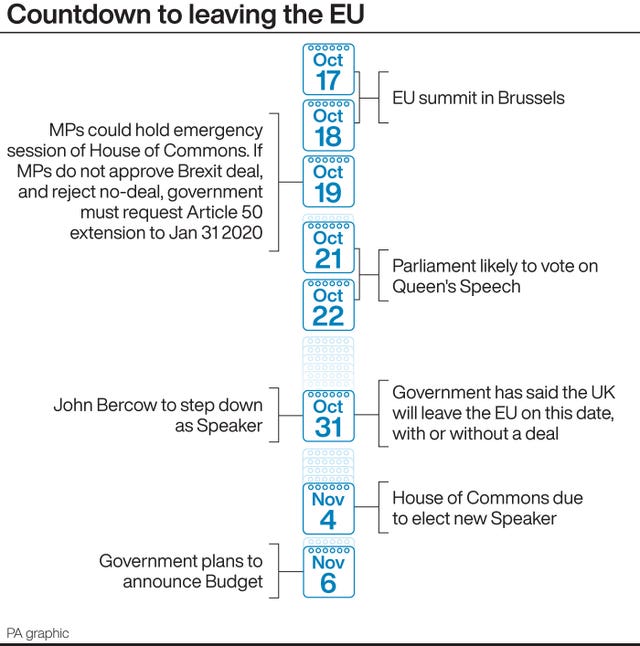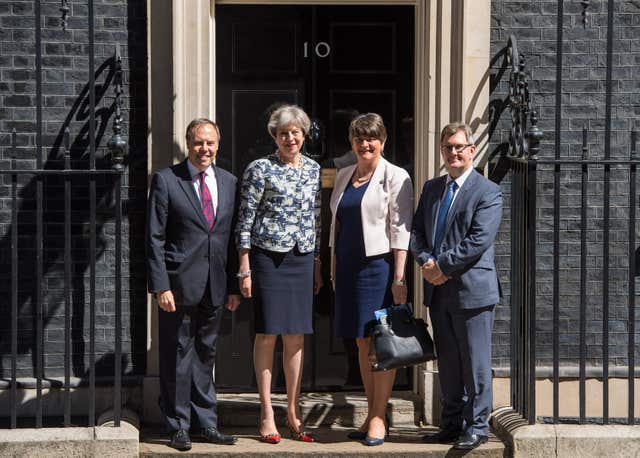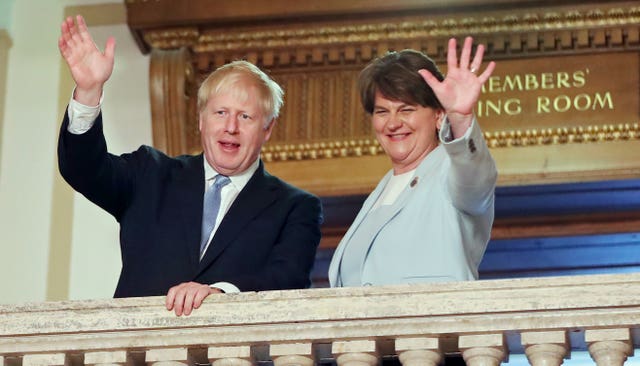How DUP became key player in Brexit process
The Northern Ireland party continues to play a pivotal role as UK and EU negotiators bid to strike a deal.

The DUP continues to play a pivotal role in Brexit as UK and EU negotiators attempt to strike a deal.
Here is the story of how the Northern Ireland party became such a key player in the process.
– 2016 referendum:

The party’s support for Brexit was not a foregone conclusion in the lead-up to the referendum. The campaign did not divide neatly along traditional orange/green lines in Northern Ireland, with the Ulster Unionist Party, for instance, backing Remain. While the DUP undoubtedly counted committed Brexiteers within its ranks, there were other senior members who had a more pro-European outlook. With the party styling itself as pro-business and having a strong farming support base, it would not have been a major surprise if the DUP had chosen to sit on the fence, allowing its representatives to take their own position on the divisive issue.
When the party did declare for Brexit, it campaigned for it enthusiastically. At one point, it shelled out hundreds of thousands of pounds for a full wraparound advert in the Metro newspaper. That incident sparked controversy in Northern Ireland when it emerged the party paid for the ad – in a paper not printed in Northern Ireland – with part of a £400,000-plus donation from a little known Brexit-backing group called the Constitutional Research Council.
– 2017 election:

Theresa May’s ill-fated decision to call a snap general election catapulted the DUP into the unexpected role of parliamentary kingmakers. The prime minister lost her majority and was only able to form a workable government through a confidence and supply arrangement with the unionist party’s 10 MPs. In return, the DUP secured a £1 billion-plus investment package for Northern Ireland. From that moment on, the party led by Arlene Foster assumed a role of influence in the Brexit process that appeared to outweigh its numbers on the Westminster benches.
– Theresa May’s deal:
DUP opposition to the agreement Mrs May struck with the EU in November 2018 was crucial. Many other MPs voted against the prime minister on the three occasions she tried and failed to secure parliamentary approval but the outcome could well have been different if the DUP had backed it. If the party had dropped its opposition to the Irish border backstop, there is an argument that several Tory Brexiteers would have followed suit, potentially giving Mrs May the numbers to edge a Commons vote.
But for the DUP, Mrs May’s controversial backstop was something it just could not stomach. For the unionists, an arrangement which would have seen Northern Ireland diverge from the rest of the UK on regulatory rules – without an obvious exit mechanism – undermined the constitutional integrity of the UK and created an economic border in the Irish Sea.
For the DUP, the Union comes above everything. Brexit has never been its raison d’etre; the Union of Great Britain and Northern Ireland is.
– Boris Johnson’s proposals:

The DUP was accused of performing a sharp U-turn when it backed Mr Johnson’s Brexit plan – proposals that also envisaged Northern Ireland in a different regulatory framework from Britain. The party rejected the claim, insisting the difference with the new blueprint was a consent provision that would have handed the Stormont Assembly, and potentially the DUP itself, a veto on both the adoption of the system and its continuation. The DUP welcomed the Prime Minister’s pledge, outlined in his letter to the EU, of another investment package for Northern Ireland. The party was also happy with Mr Johnson’s plan for a UK exit from the customs union, as the backstop would have seen the UK remain in a customs union until alternative arrangements to ensure a free-flowing Irish border had been agreed.
– Current negotiations:
Mr Johnson’s plans did not lead to a breakthrough, with the EU – and Ireland in particular – opposed to his proposals around consent and customs. The bloc was not prepared to hand a single party in a regional assembly a veto on the operation of an international treaty, while EU leaders also expressed scepticism on how an open border could be maintained if Northern Ireland and the Irish Republic were in different customs zones. As UK and EU negotiators engage in last-ditch talks to overcome the sticking points, the DUP remains a central player. Mrs Foster has been a regular visitor to Downing Street in recent days, making clear her party will not accept a deal that creates a customs border in the Irish Sea.
– Other views in Northern Ireland:
Many in Northern Ireland are frustrated at the influential role the Brexit-backing DUP has exerted, given the region voted to remain by 56% to 44%. A majority of the members elected to the currently defunct Assembly in 2017 are from pro-Remain parties and in May’s European election, two of Northern Ireland’s three seats were filled by pro-Remain/pro-backstop candidates. The main business and agriculture groups in Northern Ireland supported Mrs May’s deal – a stance that brought some of them into open conflict with the DUP. However, the region’s complex political history means the majority viewpoint on Brexit has not been articulated as loudly as it might otherwise have been in the Commons. Sinn Fein’s long-standing abstentionist policy means its seven MPs do not take their seats, leaving independent North Down MP Lady Sylvia Hermon as the sole local voice challenging the DUP’s 10 MPs.





